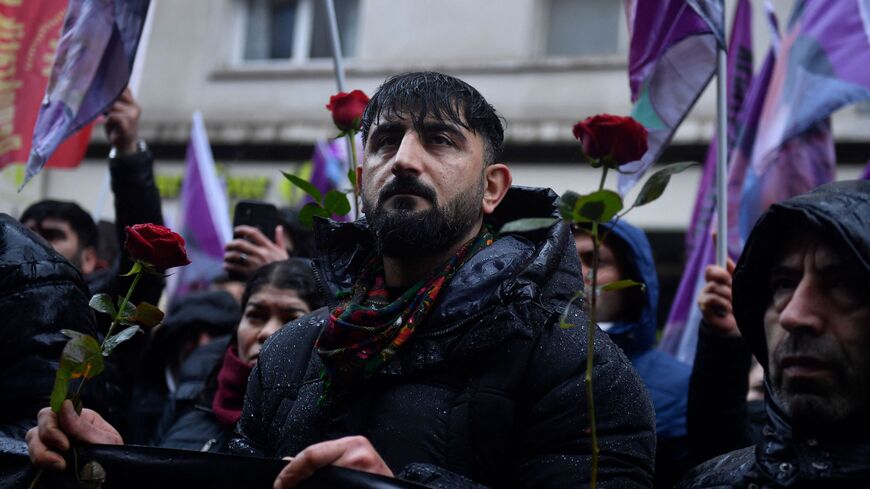Enraged by photos of French politicians among flags of the outlawed Kurdistan Workers Party (PKK), Ankara urged France to curb the PKK’s “anti-Turkish” activity on its territory in the wake of an attack against a Kurdish center in Paris.
The attack last week, carried out by a Frenchman with a record of racist attacks, aggravated Turkish-French tensions over the Kurdish question and strained the French government’s ties with its Kurdish community, as some Kurdish activists refused to believe that the shooting was the solo act of a mentally disturbed gunman. Several Kurdish activists directly accused Turkey of being behind the killings, criticizing Paris for failing to protect the Kurds from Turkish secret services and ultranationalists who operate on French territory.
On Monday, the Turkish Foreign Ministry summoned France’s ambassador to Ankara, Herve Magro, to voice dissatisfaction with the “black propaganda’” against Turkey by the PKK, which is considered a terror group by Turkey, the European Union and the United States. The Turkish side was particularly critical of the participation of French government officials and some politicians in the demonstrations held by Kurdish groups “on the pretext of an attack carried out on Dec. 23 in Paris,” Ankara sources said.
The Turkish side told Magro that it would be “beneficial” for the French government and the public to "accurately analyze" the violent incidents in Paris streets carried out by the PKK, Turkey’s official Anadolu Agency reported.
The Foreign Ministry’s summon follows multiple protests by Kurdish groups in Paris and other cities by Kurdish groups after a man identified in the French media as William M. killed three Kurds and wounded three others at Ahmet Kaya Cultural Center. The center, named after a famous Turkish-Kurdish singer who died in exile in Paris, is also home to the Kurdish Democratic Center of France (Centre Democratique Kurde de France/CDK-F), an umbrella organization that brings together different groups. “The center is very close to the PKK," confirmed Adel Bakawan, a Franco-Iraqi sociologist and director of the French Center for Research on Iraq (CFRI), to the French daily Figaro. “The people who run this center are committed activists.”
The attacker, a retired train driver and a gun enthusiast who was charged last year with racist violence after allegedly stabbing migrants and slashing their tents with a sword in a park in eastern Paris, confessed to a “pathological hate of foreigners.” He was put in psychiatric care but released back to ordinary police custody Sunday. On Monday, he appeared before an investigating judge.
French officials and international figures offered condolences to the victims’ families and the Kurdish community over the weekend. French President Emmanuel Macron said the capital's Kurdish community was the "target of a heinous attack" and praised police for their "courage.” US Secretary of State Antony Blinken also offered condolences to the Kurdish and French people. "My deepest sympathies go out to the victims of the attack at the Kurdish cultural center in Paris," Blinken wrote on Twitter.
In Turkey, the pro-Kurdish Peoples' Democratic Party (HDP) immediately condemned the attack. Selahattin Demirtas, the imprisoned HDP co-chair, tweeted in French to express condolences to the Kurdish community, adding, “It is the French state’s responsibility to bring all the perpetrators of that attack before justice." Ali Babacan, chairman of AKP-offshoot DEVA, called on France to intensify its fight against racism.
French officials described the attack as “racist” rather than an act of terrorism. But Kurdish representatives, who met on Saturday with French Justice Minister Eric Dupond-Moretti, reiterated their call for Friday's shooting to be considered a terror attack.
The shooting also revived the trauma of the unresolved murders of three Kurdish women in 2013 that many blame on Turkey and fanned worries that French security services did little to prevent the shooting. "In 10 years, six Kurdish activists have been killed in the heart of Paris in broad daylight," Berivan Firat, a spokesperson for the CDK-F, told BFM TV at the demonstration. Firat and Agit Polat, another spokesman, hinted that Turkish security groups and even the ultranationalist Grey Wolves could be behind the attack.
The frustrations led to violence in the Kurdish demonstrations over the weekend. A group of demonstrators on Friday night clashed with police, who used tear gas to stop protesters from approaching Interior Minister Gerald Darmanin, who arrived at the scene. The demonstrators threw objects at police in response, set rubbish bins on fire and smashed the windows of some cars with bricks.
The next day, a large-scale demonstration at the Place de la Republique started peacefully but turned violent as some threw projectiles and clashed with the police, who eventually fired tear gas. Some of the slogans urged France to protect its Kurdish community better, while others directly attacked the Turkish government or shouted for the liberation of Abdullah Ocalan.
Pro-government media outlets in Turkey reported at length the clashes between the Kurdish demonstrators and the police, interpreting it as a sign that the PKK had turned against the hand that fed it.
Ibrahim Kalin, the presidency spokesman, blamed the PKK and its Syrian offshoot, the People's Protection Units (YPG), for the street unrest that gripped Paris.
"This is PKK in France," Kalin tweeted, posting a clip of overturned and burning cars in Paris. "The same terrorist organization you support in Syria," he added in a veiled reference to France’s criticism of Turkish military operations in Syria. “Then they chant, ‘We are all PKK.’”








